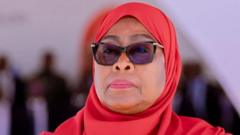Where Were the Missing Kenyan Activists Found After Five Weeks in Uganda?

Published: 2025-11-08 10:00:24 | Category: world
The recent confirmation of the safety of two Kenyan activists, Bob Njagi and Nicholas Oyoo, who disappeared in Uganda five weeks ago, has raised significant concerns about human rights in East Africa. Eyewitnesses reported their abduction by masked men after they supported opposition leader Bobi Wine at a political event. Their safe return highlights issues of regional collaboration among governments in suppressing dissent.
Last updated: 12 October 2023 (BST)
What’s happening now
Human rights groups in Kenya have confirmed that Bob Njagi and Nicholas Oyoo are alive and safe after their disappearance in Uganda. Vocal Africa, an activist organisation, announced that the activists are being transported from Busia, Uganda, to Nairobi, Kenya. Their abduction followed their participation in a political event supporting Bobi Wine, who is running for president against long-serving leader Yoweri Museveni. This incident has reignited discussions around the treatment of political dissidents in East Africa and the collaboration of regional governments in suppressing opposition.
Key takeaways
- Activists Bob Njagi and Nicholas Oyoo have been confirmed safe after their abduction in Uganda.
- Their disappearance occurred after they supported opposition leader Bobi Wine.
- Ugandan police denied holding the activists, despite evidence of their abduction.
- Human rights groups are concerned about the collaboration of East African governments in suppressing dissent.
- Past incidents of disappearances and abuses of activists have raised alarms across the region.
Timeline: how we got here
Below is a brief timeline highlighting key events leading up to the recent developments concerning Njagi and Oyoo:
- 16 September 2023: Njagi and Oyoo disappear in Uganda after being seen being forced into a car by masked men.
- 18 September 2023: Eyewitnesses report their abduction to local authorities.
- 30 September 2023: Vocal Africa begins advocacy efforts for the activists’ release.
- 7 October 2023: Activists confirmed safe and in transit to Nairobi.
What’s new vs what’s known
New today/this week
The primary development is the confirmation by Vocal Africa that Bob Njagi and Nicholas Oyoo are safe and being transported back to Kenya. This news has been met with relief among human rights advocates, who have been campaigning for their release.
What was already established
Prior to their confirmation, it was widely believed that the activists had been abducted due to their political affiliations. Ugandan police denied any involvement, which is consistent with the pattern of denial often observed in similar cases across the region. Historically, political dissidents have faced severe repercussions, including abduction and detention without trial.
Impact for the UK
Consumers and households
The situation in East Africa, particularly regarding human rights violations, may resonate with UK citizens, especially those involved in activism or humanitarian efforts. Awareness of these issues may influence public opinion and advocacy for stronger international human rights policies.
Businesses and jobs
While the immediate implications for UK businesses may be limited, the perception of Uganda and Kenya as unstable environments could affect investment and trade decisions. Companies operating in or with ties to these regions may need to reassess their risk management strategies.
Policy and regulation
This incident could prompt UK policymakers to engage more rigorously with East African nations regarding human rights practices. Increased dialogue or pressure may be required to address ongoing abuses and promote democratic principles in the region.
Numbers that matter
- 2: The number of activists confirmed safe after their disappearance.
- 5 weeks: Duration of time the activists were missing before their safe return.
- 36: The age of opposition leader Bobi Wine, who has gained significant support among the youth in Uganda.
- 1986: The year President Yoweri Museveni came to power, marking 37 years of his rule.
- 1: The number of joint statements released by human rights organisations thanking those involved in advocating for the activists.
Definitions and jargon buster
- Human Rights: The basic rights and freedoms that belong to every person in the world, from birth until death.
- Abduction: The act of forcibly taking someone away against their will.
- Dissent: The expression of opinions that differ from those officially held or sanctioned.
- Opposition Leader: A politician who leads a party that opposes the ruling government.
How to think about the next steps
Near term (0–4 weeks)
In the immediate future, activists and human rights organisations are likely to continue campaigning for the protection of political dissidents in East Africa. Monitoring the situation closely will be crucial to ensure the safety of those involved in activism.
Medium term (1–6 months)
There may be increased pressure on both the Ugandan and Kenyan governments to address human rights abuses. Potential changes in policy or public statements from both governments could arise as they attempt to manage international relations and domestic unrest.
Signals to watch
- Statements from human rights organisations regarding the treatment of activists.
- Changes in political rhetoric from Ugandan and Kenyan leaders.
- Any further incidents of abduction or harassment of activists in the region.
Practical guidance
Do
- Stay informed about the situation in East Africa and support human rights initiatives.
- Engage in advocacy efforts to raise awareness about political repression in the region.
- Participate in discussions and forums addressing human rights and governance issues.
Don’t
- Ignore the potential implications of these events on regional stability.
- Assume that the situation is isolated to Uganda or Kenya without considering broader regional dynamics.
- Dismiss the importance of international pressure in influencing government actions.
Checklist
- Subscribe to updates from human rights organisations.
- Follow news outlets covering East African politics and human rights.
- Engage with local or online communities focused on activism.
- Educate yourself on the historical context of political dissent in East Africa.
- Support campaigns aimed at protecting political prisoners and activists.
Risks, caveats, and uncertainties
The situation remains fluid, and while the return of Njagi and Oyoo is a positive development, it raises questions about the safety of other activists in the region. The potential for further abductions or retaliatory actions by authorities cannot be discounted. Moreover, the extent of government collaboration in suppressing dissent remains an area of concern that requires ongoing scrutiny.
Bottom line
The safe return of Bob Njagi and Nicholas Oyoo sheds light on the precarious state of human rights in East Africa. It underscores the need for continued vigilance and advocacy to protect activists and uphold democratic principles. As the political climate evolves, it remains crucial for individuals and organizations to remain engaged and informed about these issues.
FAQs
What happened to Bob Njagi and Nicholas Oyoo?
Bob Njagi and Nicholas Oyoo were abducted in Uganda but have now been confirmed safe and are being transported back to Kenya.
Why were the activists targeted?
The activists were reportedly targeted for their support of opposition leader Bobi Wine, highlighting the risks faced by political dissidents in Uganda.
What does this incident signify for human rights in East Africa?
This incident underscores the ongoing challenges and risks faced by activists in East Africa, indicating a need for greater advocacy and protection of human rights.



